| Listing 1 - 10 of 25 | << page >> |
Sort by
|
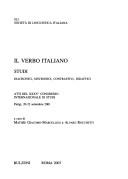
ISBN: 8883198514 Year: 2003 Publisher: Roma Bulzoni
Abstract | Keywords | Export | Availability | Bookmark
 Loading...
Loading...Choose an application
- Reference Manager
- EndNote
- RefWorks (Direct export to RefWorks)
Italian language --- Grammar --- Grammar, Comparative and general --- Romance languages --- Comparative grammar --- Grammar, Philosophical --- Grammar, Universal --- Language and languages --- Philosophical grammar --- Linguistics --- Philology --- Verb --- Grammar, Comparative
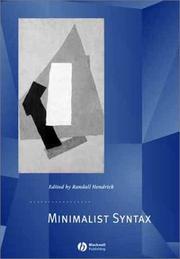
ISBN: 0631219412 Year: 2003 Publisher: Malden Blackwell
Abstract | Keywords | Export | Availability | Bookmark
 Loading...
Loading...Choose an application
- Reference Manager
- EndNote
- RefWorks (Direct export to RefWorks)
Grammar, Comparative and general --- -Minimalist theory (Linguistics) --- Generative grammar --- Comparative grammar --- Grammar --- Grammar, Philosophical --- Grammar, Universal --- Language and languages --- Philosophical grammar --- Linguistics --- Philology --- Syntax --- Grammar, Comparative --- Minimalist theory (Linguistics) --- Syntax. --- Minimalist theory (Linguistics). --- Grammar, Comparative and general Syntax
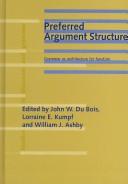
ISBN: 9027226245 1588113698 9786612160905 1282160907 9027296138 9789027296139 9781588113696 9781282160903 661216090X Year: 2003 Volume: 14 Publisher: Amsterdam Philadelphia John Benjamins Pub. Co.
Abstract | Keywords | Export | Availability | Bookmark
 Loading...
Loading...Choose an application
- Reference Manager
- EndNote
- RefWorks (Direct export to RefWorks)
Preferred Argument Structure offers a profound insight into the relationship between language use and grammatical structure. In his original publication on Preferred Argument Structure, Du Bois (1987) demonstrated the power of this perspective by using it to explain the origins of ergativity and ergative marking systems. Since this work, the general applicability of Preferred Argument Structure has been demonstrated in studies of language after language. In this collection, the authors move beyond verifying Preferred Argument Structure as a property of a given language. They use the methodology to reveal more subtle aspects of the patterns, for example, to look across languages, diachronically or synchronically, to examine particular grammatical relations, and to examine special populations or particular genres. This volume will appeal to linguists interested in the relationship of pragmatics and grammar generally, in the typology of grammatical relations, and in explanations derived from data- and corpus-based approaches to analysis.
Grammar --- Grammaire comparée et générale --- Grammaire générale --- Grammaire générale et comparée --- Grammaire philosophique --- Grammaire universelle --- Grammar [Comparative and general ] --- Spraakkunst [Vergelijkende en algemene ] --- Grammar, Comparative and general --- Comparative grammar --- Grammar, Philosophical --- Grammar, Universal --- Language and languages --- Philosophical grammar --- Linguistics --- Philology --- Grammar, Comparative --- Grammar, Comparative and general. --- Linguistics.
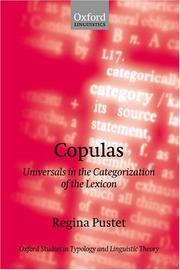
ISBN: 0199258503 019171772X 1280907746 Year: 2003 Publisher: Oxford Oxford university press
Abstract | Keywords | Export | Availability | Bookmark
 Loading...
Loading...Choose an application
- Reference Manager
- EndNote
- RefWorks (Direct export to RefWorks)
Lexicology. Semantics --- Grammar, Comparative and general --- -Parts of speech --- Semantics --- Comparative grammar --- Grammar --- Grammar, Philosophical --- Grammar, Universal --- Language and languages --- Philosophical grammar --- Linguistics --- Philology --- Formal semantics --- Semasiology --- Semiology (Semantics) --- Comparative linguistics --- Information theory --- Lexicology --- Meaning (Psychology) --- Copula --- Grammatical categories --- Grammar, Comparative --- Parts of speech. --- Semantics. --- Copula. --- Parts of speech --- Copula (Grammar) --- Verb phrase

ISBN: 1575864088 157586407X 9781575864075 9781575864082 Year: 2003 Publisher: Stanford (Calif.): CSLI
Abstract | Keywords | Export | Availability | Bookmark
 Loading...
Loading...Choose an application
- Reference Manager
- EndNote
- RefWorks (Direct export to RefWorks)
Providing a unified solution within the frameworks of Construction Grammar and Frame Semantics, Hans Boas develops an account of resultative constructions in English by grouping them in two classes: conventionalized and non-conventionalized. The usage-based model used here proposes that each particular sense of a verb constitutes a conventionalized mini-construction, which is crucial information for the licensing of arguments. In contrast, verbs in non-conventionalized resultative constructions can acquire a novel meaning and thereby a new syntactic frame. English and German resultatives are compared to illustrate the distinct lexical polysemy networks of English and German verbs.
Grammar --- 802.0-56 --- Grammar, Comparative and general --- -Comparative grammar --- Grammar, Philosophical --- Grammar, Universal --- Language and languages --- Philosophical grammar --- Linguistics --- Philology --- Engels: syntaxis; semantiek --- Resultative constructions --- Grammar, Comparative --- Resultative constructions. --- -Engels: syntaxis; semantiek --- 802.0-56 Engels: syntaxis; semantiek --- -802.0-56 Engels: syntaxis; semantiek --- Comparative grammar --- Resultative (Linguistics) --- Resultant constructions --- Syntax --- Grammar, Comparative and general - Resultative constructions
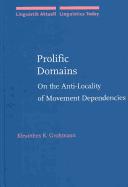
ISBN: 9027227896 1588114414 9786612160653 1282160656 9027295786 9789027295781 9781588114419 9789027227898 Year: 2003 Publisher: Amsterdam Philadelphia J. Benjamins
Abstract | Keywords | Export | Availability | Bookmark
 Loading...
Loading...Choose an application
- Reference Manager
- EndNote
- RefWorks (Direct export to RefWorks)
Standard conceptions of Locality aim to establish that a dependency between two positions may not span too long a distance. This book explores the opposite conception, Anti-Locality: Don't move too close. The model of clause structure, syntactic computation, and locality concerns Kleanthes Grohmann develops makes crucial use of derivational sub-domains, Prolific Domains, each encapsulating particular context information (thematic, agreement, discourse). The Anti-Locality Hypothesis is the attempt to exclude anti-local movement from the grammar by banning movement within a Prolific Domain, a Bare Output Condition. The flexible application of the operation Spell Out, coupled with an innovative view on grammatical formatives, leads to a natural caveat: Copy Spell Out. Grohmann explores a theory of Anti-Locality relevant to all three Prolific Domains in the clausal layer as well as the nominal layer, and offers a unified account of Standard and Anti-Locality regarding clause-internal movement and operations across clause boundaries, revisiting successive cyclicity.
Grammar, Comparative and general --- -Minimalist theory (Linguistics) --- Generative grammar --- Comparative grammar --- Grammar --- Grammar, Philosophical --- Grammar, Universal --- Language and languages --- Philosophical grammar --- Linguistics --- Philology --- Syntax --- Grammar, Comparative --- Minimalist theory (Linguistics). --- Syntax. --- Minimalist theory (Linguistics) --- LANGUAGE ARTS & DISCIPLINES --- Grammar & Punctuation --- Grammar, Comparative and general Syntax

ISBN: 1575863995 9781575863993 1575864002 9781575864006 Year: 2003 Publisher: Stanford (Calif.): CSLI
Abstract | Keywords | Export | Availability | Bookmark
 Loading...
Loading...Choose an application
- Reference Manager
- EndNote
- RefWorks (Direct export to RefWorks)
This second edition of 'Syntactic Theory: A Formal Introduction' expands and improves upon a truly unique introductory syntax textbook. Like the first edition, its focus is on the development of precisely formulated grammars whose empirical predictions can be directly tested. There is also considerable emphasis on the prediction and evaluation of grammatical hypotheses, as well as on integrating syntactic hypotheses with matters of semantic analysis. The book covers the core areas of English syntax from the last quarter century, including complementation, control, "raising constructions," passives, the auxiliary system, and the analysis of long distance dependency constructions. 'Syntactic Theory's step-by-step introduction to a consistent grammar in these core areas is complemented by extensive problem sets drawing from a variety of languages.' 'The book's theoretical perspective is presented in the context of current models of language processing, and the practical value of the constraint-based, lexicalist grammatical architecture proposed has already been demonstrated in computer language processing applications. This thoroughly reworked second edition includes revised and extended problem sets, updated analyses, additional examples, and more detailed exposition throughout.' 'Praise for the first edition:' '"Syntactic Theory sets a new standard for introductory syntax volumes that all future books should be measured against."--Gert Webelhuth, Journal of Linguistics'
801.56 --- Grammar, Comparative and general --- -Comparative grammar --- Grammar --- Grammar, Philosophical --- Grammar, Universal --- Language and languages --- Philosophical grammar --- Linguistics --- Philology --- Syntaxis. Semantiek --- Syntax --- Grammar, Comparative --- Syntax. --- -Syntaxis. Semantiek --- 801.56 Syntaxis. Semantiek --- -801.56 Syntaxis. Semantiek --- Comparative grammar --- Grammar, Comparative and general Syntax
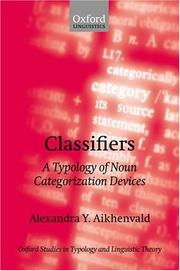
ISBN: 9780199264667 019926466X Year: 2003 Publisher: Oxford New York : Oxford University Press,
Abstract | Keywords | Export | Availability | Bookmark
 Loading...
Loading...Choose an application
- Reference Manager
- EndNote
- RefWorks (Direct export to RefWorks)
Categorization (Linguistics) --- Classifiers (Linguistics) --- Grammar, Comparative and general --- -801.5 --- Comparative grammar --- Grammar --- Grammar, Philosophical --- Grammar, Universal --- Language and languages --- Philosophical grammar --- Linguistics --- Philology --- Auxiliary numerals (Linguistics) --- Determinatives (Linguistics) --- Classification (Linguistics) --- Linguistic analysis (Linguistics) --- Noun --- Grammatica --- Grammar, Comparative --- Classifiers --- Noun. --- 801.5 Grammatica --- Categorization (Linguistics). --- Classifiers (Linguistics). --- 801.5 --- Nominals --- Grammar, Comparative and general - Noun
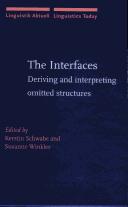
ISBN: 9027227845 1588113302 902729691X 058546751X 9786612255472 1282255479 9780585467511 9789027296917 9781588113306 9789027227843 Year: 2003 Publisher: Amsterdam Philadelphia J. Benjamins Pub. Co.
Abstract | Keywords | Export | Availability | Bookmark
 Loading...
Loading...Choose an application
- Reference Manager
- EndNote
- RefWorks (Direct export to RefWorks)
The Interfaces: Deriving and Interpreting Omitted Structures is a collection of never-before-published papers that explore the nature of the interfaces of syntax with semantics, phonology, and discourse. The papers investigate the various ways in which elliptical structures are related to these interfaces. As such, they not only make a valuable contribution to generative linguistic research but, more generally, help to deepen our understanding of the relation between form and meaning in natural language.In the book's introductory chapter, the editors address general issues related to current work on ellipsis and the syntax/semantics, syntax/phonology and syntax/discourse interfaces. The rest of the book is organized into three parts. The first examines PF-deletion accounts of elliptical structures; the second investigates these structures from the perspective of the syntax/semantic interface; and the third explores these from a perspective that concentrates on the relation between semantics and focus and discourse structure. Together the papers collected in this volume offer a convincing demonstration of the value of collaborative research on the 'interfaces'.
Lexicology. Semantics --- Comparative linguistics --- Grammar --- 801.56 --- Grammar, Comparative and general --- -Grammar, Comparative and general --- -Semantics --- Formal semantics --- Semasiology --- Semiology (Semantics) --- Information theory --- Language and languages --- Lexicology --- Meaning (Psychology) --- 801.56 Syntaxis. Semantiek --- Syntaxis. Semantiek --- Comparative grammar --- Grammar, Philosophical --- Grammar, Universal --- Philosophical grammar --- Linguistics --- Philology --- Ellipsis --- Syntax --- Grammar, Comparative --- Semantics. --- Ellipsis. --- Syntax. --- Grammar, Comparative and general Syntax
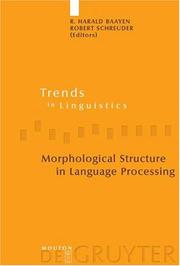
ISBN: 3110178923 3110910187 Year: 2003 Volume: 151 Publisher: Berlin ; New York, NY : Mouton de Gruyter,
Abstract | Keywords | Export | Availability | Bookmark
 Loading...
Loading...Choose an application
- Reference Manager
- EndNote
- RefWorks (Direct export to RefWorks)
This volume brings together a series of studies of morphological processing in Germanic (English, German, Dutch), Romance (French, Italian), and Slavic (Polish, Serbian) languages. The question of how morphologically complex words are organized and processed in the mental lexicon is addressed from different theoretical perspectives (single and dual route models), for different modalities (auditory and visual comprehension, writing), and for language development. Experimental work is reported, as well as computational and statistical modeling. Thus, this volume provides a useful overview of the range of issues currently attracting research at the intersection of morphology and psycholinguistics.
Grammar, Comparative and general --- Psycholinguistics --- Language, Psychology of --- Language and languages --- Psychology of language --- Speech --- Linguistics --- Psychology --- Thought and thinking --- Comparative grammar --- Grammar --- Grammar, Philosophical --- Grammar, Universal --- Philosophical grammar --- Philology --- Morphology&delete& --- Psychological aspects --- Grammar, Comparative --- Psycholinguistics. --- Morphology --- Psychological aspects. --- Morphologie (Linguistique) --- Psycholinguistique --- Aspect psychologique --- GRAMMAIRE COMPAREE ET GENERALE --- MORPHOLOGIE --- ASPECT PSYCHOLOGIQUE
| Listing 1 - 10 of 25 | << page >> |
Sort by
|

 Search
Search Feedback
Feedback About UniCat
About UniCat  Help
Help News
News